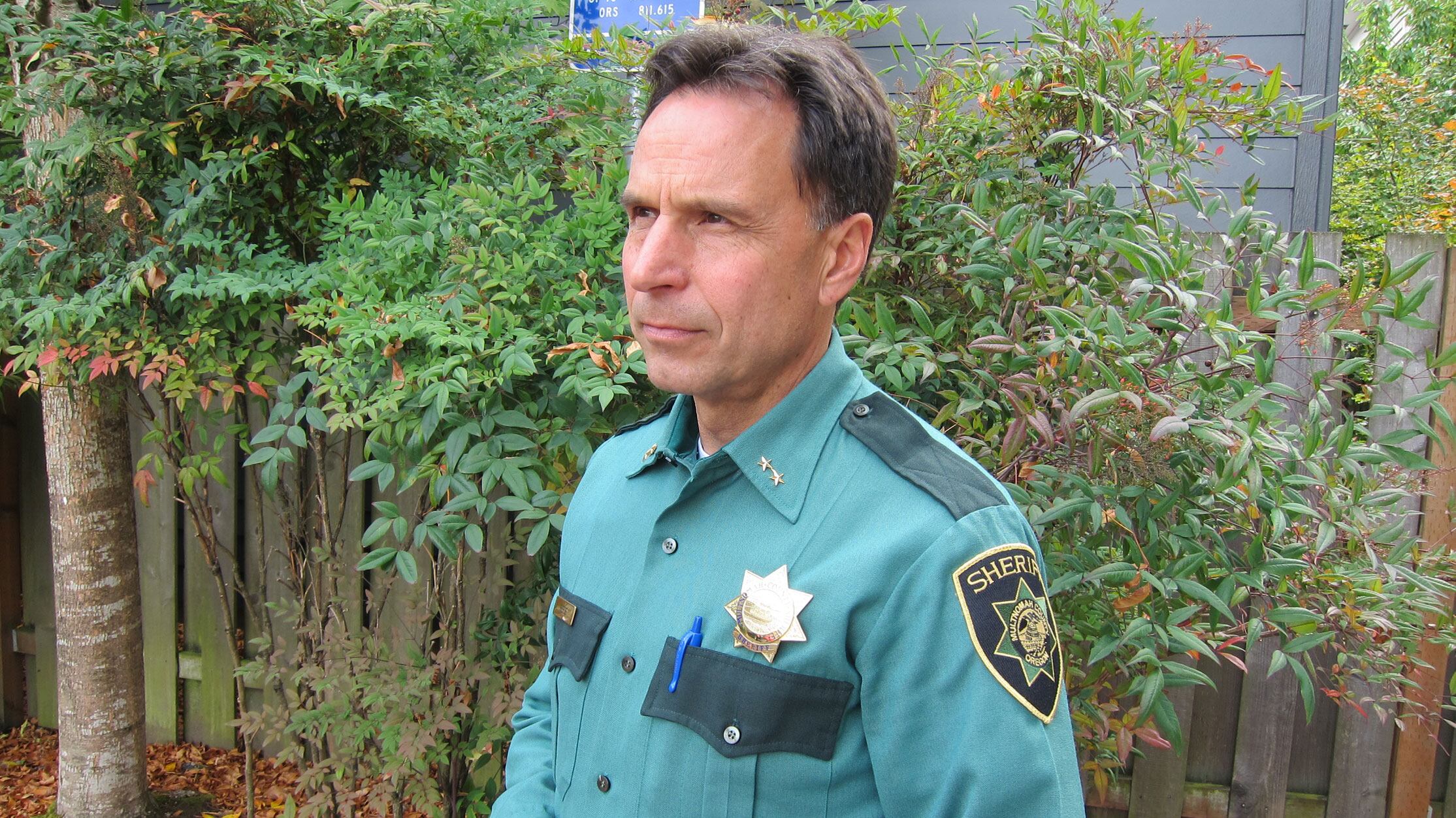In the Multnomah County criminal justice system, people have posed tough questions for two separate groups: the sheriff's office that investigates crime, and the district attorneys who prosecute the offenders.
These are their answers.
Multnomah County Sheriff Mike Reese and District Attorney Rod Underhill are both elected officials. And in a left-leaning city like Portland, they've staked their political futures on taking more progressive positions than many of their colleagues in other counties.
But recent events have challenged those reputations. Last month, an investigation of three sheriff's deputies who shared information with federal immigration officials found no wrongdoing—a result that frustrated advocates. Other observers have raised questions about the conditions in county jails the sheriff runs; a woman died there this summer, and the cause remains a mystery.
Meanwhile, the power of the district attorney is one of the most hotly contested issues in the criminal justice system nationwide. In Oregon, most sitting district attorneys win their seats uncontested. The American Civil Liberties Union of Oregon recently launched a campaign to address that voter apathy. That campaign is making some incumbent DAs furious.
In the past week, WW presented both Reese and Underhill with some of the toughest questions surrounding their offices.
WW: An investigation of three sheriff's deputies who had shared information with ICE, seemingly against the sheriff's policies, was closed without findings of wrongdoing. Can you explain that?
Mike Reese: I'm not going to be able to comment on a specific personnel action by our HR policies and state law and our contracts—those are confidential matters. But when we looked at our policy and our guidance to our employees on state law, I felt there wasn't the clarity that there needed to be.
I really believe our values as an organization should be in alignment with our community values. So we created a model policy on how we're going to interact on immigration issues. We trained our employees to it. We're making sure that that is being carried out in practice. And we have complete and thorough investigations when there are complaints.
A woman died in your custody this summer, and very few details have been released about the investigation into her death. Why hasn't your office made more details available to the public in the past three months?
I am frustrated as well. That information is at the medical examiner's office. With every death in custody, whether it is a natural death—you know we deal with a lot of people who come into our facilities charged with serious crimes who are medically fragile—we do a criminal investigation. We have detectives who review that. That goes to the District Attorney's Office for an independent assessment and then to the medical examiner's office. In the state of Oregon, the medical examiner is the holder of that information. I'm waiting for the final results to come back.
How do you approach homelessness in Portland as the sheriff?
Most of the folks that are homeless are not engaged in criminal behavior. But it's concerning to our neighborhoods and the folks that live and work in those areas.
The people who are living on the streets are incredibly vulnerable. Too many of them have mental health or addiction issues. You have a lot of women who are living outdoors who become the victims of sexual violence. So we've got to have a better response to that.
We can't have large camps. That creates an unhealthy dynamic. If people are camping, do it in small numbers. You've got to be able to pick up and move when asked.
WW: In your last election, 48 percent of people who cast a ballot chose not to vote for district attorney. Do you think that's a problem?
Rod Underhill: That's in part why I said yes to this conversation. If we're doing good work, we want people to know about it. If we're doing work that needs to be done better, we want people to know about that as well. But both things come with letting people know who we are and what we do.
I think that to the extent that people do know what we're working on, because there are some who certainly do, I think we're hearing them and we're listening to them. But we can do better.
A MacArthur Foundation study found that black people were six times more likely to be jailed in Multnomah County than white people. How do you try to tackle that issue as a prosecutor?
We don't make the arrests, but we do receive the cases. Since 2013, Multnomah County has reduced our overall prison "first sentence" response [the number of people sent to prison on a first criminal conviction] about 24 percent. That's going to be Caucasian, Hispanic, African-American—all are reduced. Have we reduced the disproportionality? The answer is, not really.
The other area we're focusing on is second sentences. We're putting a lot of people on probation, but a lot of them are going to prison subsequently on second sentences. We'd rather not send someone to prison if we don't have to.
In the past, you've argued that reducing the prison population might cause an increase in crime. How do you factor in public safety when implementing programs focused on providing alternatives to prison and jail?
It's a careful balance. Public safety is the cornerstone of my job. It's this balance between can we come up with good ideas that are less punitive while simultaneously adhering to and improving upon public safety?
From a violent-crime standpoint, the country and then Oregon and then Multnomah County within Oregon have seen a long-term drop in violent crime. [But] property crimes continue to be on the rise. Why? Everybody is asking that question. We need to pay careful attention to what those answers are.

